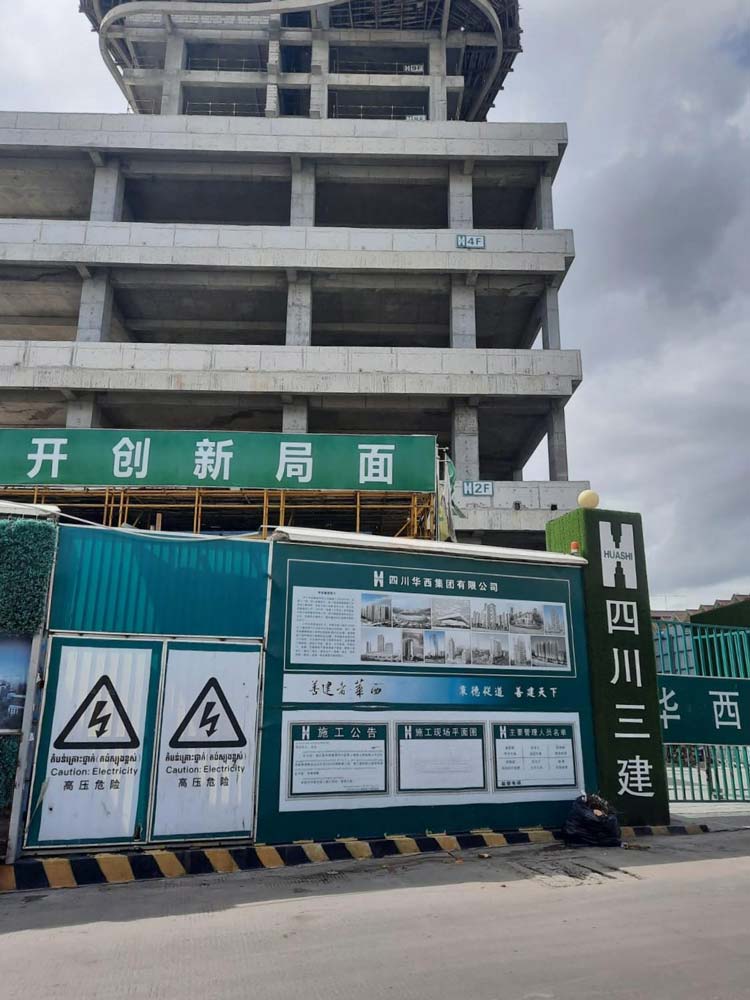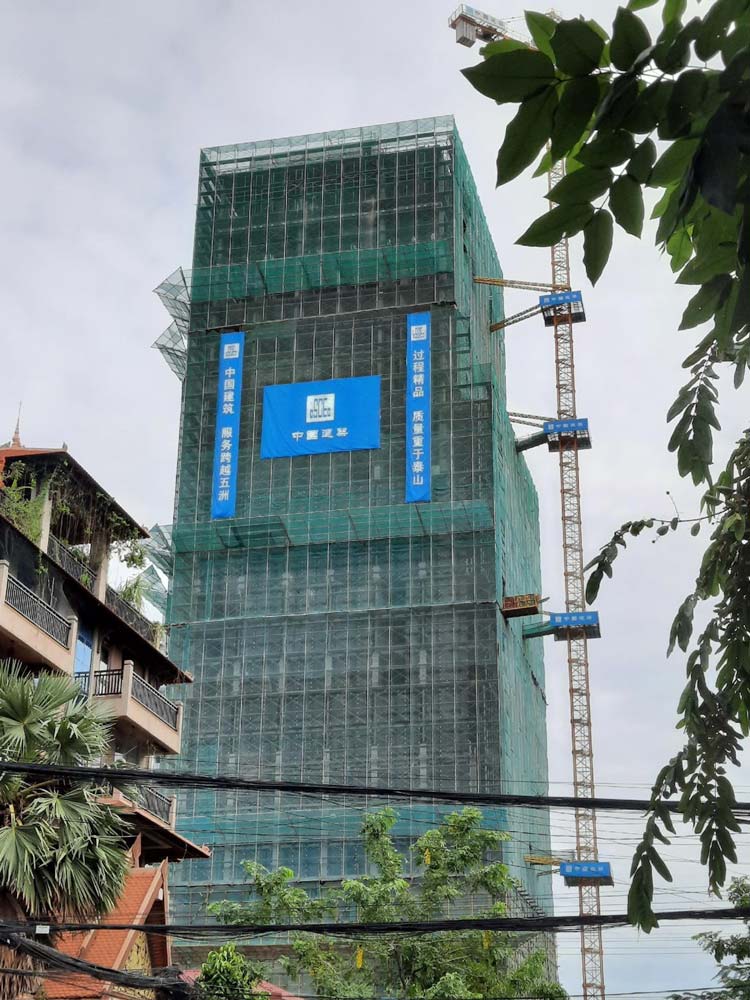International Contracting
Chinese companies are not only active globally as project developers, they also provide billions of dollars of contracting services every year. This may include, for example, design work, construction, operation and maintenance, equipment supply and logistics. Hundreds of Chinese contractors are active around the world, and the total value of this contracting is worth much more than Chinese overseas investment.
This sector is dominated by subsidiaries of central state-owned enterprises, but larger provincial and municipal state-owned enterprises are also major contractors. The top global contractors include China State Construction Engineering Corporation, China Road and Bridge Corporation, and Sinohydro Corporation.
The role of state-owned contractors goes beyond the contribution they make in terms of services such as construction. They also have access to credit from Chinese banks, often in the form of export buyers’ credits (where a Chinese bank such as the Eximbank provides a loan to the project developer to purchase goods or services from a specific contractor).
Infrastructure and construction projects supported by loans from China are generally contracted to Chinese state-owned enterprises. Chinese companies win contracts for projects developed and financed by other Chinese companies and banks, but also from local companies and non-Chinese multinationals, which may have diverse sources of finance. They are also major recipients of contracts for projects financed by multilateral development banks like the World Bank.
Chinese contractors often proactively seek investment opportunities, developing links with local partners and identifying projects, then approaching Chinese banks to facilitate financing. As Chinese overseas contracting has expanded, competition between Chinese contractors has increased.
Several administrative regulations apply to overseas contracting, although they only make basic references to social and environmental standards. However, there have been signs for several years that there is a growing awareness within Chinese state institutions that more needs to be done to ensure that overseas contractors operate in a way that is socially and environmentally responsible.
The China International Contracting Association (CHINCA) has developed several industry policies and guidelines for contractors that go into more detail on the steps contractors should take to enhance their performance. Contractors are also subject to several of the government policies included in the Standards section of the guide, and state-owned enterprises are subject to the regulations of the State-owned Assets Supervision and Administration Commission.


Regulations on Contracting Foreign Projects
In 2008, China’s State Council issued an administrative regulation on overseas contracting, which was updated in 2017. The Administrative Regulation on Contracting Foreign Projects (State Council [2017] #527) has legal force over companies providing overseas contracting services for construction. The regulation mostly deals with issues related to contracts, competition and labor recruitment, but it also covers project safety and quality, as well as emergency response.
If a contractor fails to address project quality, safety issues, or emergency incidents, it may be fined, suspended from taking new contracts for 1-3 years, and in serious cases may have its certification for overseas contracts revoked (Article 20). According to the Emergency Response Law of China, emergency incidents include natural disasters, serious accidents, public health incidents and public security incidents that occur abruptly and cause (or may potentially cause) serious social harm requiring emergency response measures.
The Ministry of Commerce and its relevant departments are responsible for supervision and administration of overseas contracting. Overseas contracting projects are subject to similar mechanisms of approval, reporting, monitoring and penalties as outbound investment projects (see Standards section), although the specific requirements vary. Most projects are not required to secure approval and only have to file documents with the Ministry of Commerce (or its relevant subnational level department). Approval is only required for projects in countries without diplomatic relations with China, projects involving “multi-country interests” or major regional safety risks (such as projects affecting transboundary water resources, transportation, oil, gas and mineral extraction projects, or projects in disputed territories).
To implement the State Council regulation, the Ministry of Commerce issued the Notice on Further Strengthening Reporting of Contracting Foreign Projects (MOFCOM [2021] #204). Contractors are required to report to the Ministry of Commerce (or its relevant subnational level department) regarding emergencies or other significant incidents within 24 hours. Such incidents include major project quality issues and safety accidents, protests or clashes, anti-corruption investigations by foreign institutions or foreign media reports on corruption issues related to the company, environmental emergencies, environmental penalties imposed by host countries, foreign media reports on major ecological and environmental issues related to the company, and major public criticism.
If a company repeatedly fails to fulfill the reporting requirements, regardless of warnings from the Ministry of Commerce, its non-compliance will be recorded in the corporate credit system (see Standards section). The Ministry of Commerce is also required to strengthen communication with local embassies in order to identify risk issues in a timely manner. Therefore, if you believe that any of the above issues occur in a project contracted to a Chinese company, you may proactively report this to the local Chinese embassy or consulate.
Under the Ministry of Commerce rules, supervising authorities conduct regular follow-up inspections of randomly selected companies, or targeted investigations of companies that have been linked to significant impacts. According to its Inspection Procedures, the Ministry of Commerce checks whether a contractor has environmental policies in place and implements them, in addition to monitoring contractors’ safety and security management, emergency management and fulfillment of reporting requirements, among other things. Companies will also have other detrimental behaviors recorded in their credit records, as well as the records of the people in charge. Such detrimental behaviors include actions that violate the laws and regulations of recipient countries, violate UN resolutions or other international conventions, that harm China’s reputation and interests or that violate the lawful rights of workers.
Sectoral Guidelines and Mechanisms for Chinese International Contractors
China International Contractors Association (CHINCA) is an industry association that plays a key role in Chinese overseas contracting. It has over 1,300 members, including China Railway Group, Powerchina, Shanghai Construction Group, Bank of China and the Export-Import Bank of China. It is not a government institution, but it works closely with the Ministry of Commerce. CHINCA has issued a number of standards, measures and guidelines to discipline and guide the practice of Chinese overseas contractors. CHINCA has a role in recommending and rating companies, meaning that some of the measures discussed below can affect the ability of contractors to get project contracts and/or finance.
- Penalty Measures for Non-compliance: Violations subject to CHINCA penalties include quality or safety problems that result in an accident, failure to abide by laws and regulations of host countries, receiving penalties from international financial institutions, and damage to the environment or harm to communities. These failures can result in a warning, which will be publicly disclosed. Failure to take action after a warning can lead to a reduced credit rating and ranking (see below). CHINCA may also stop recommending the company for projects for a period of half a year to two years.
- Credit Ratings: CHINCA was one of the first industry associations to pilot sectoral credit ratings. It has built credit files for many of its members, documenting both “good credit” and “bad credit.” “Bad credit” can result from major quality issues or safety accidents, failure to respect local customs, religions or traditions that leads to conflicts with local people, violations of local laws or policies regarding labor issues that lead to major disputes, damage to environment and ecosystems, threats to public safety in host countries, and other major violations of laws and policies, among other things. CHINCA conducts and publishes credit ratings annually. The assessment committee involves relevant government departments and financial institutions. According to its website, the credit assessment is referred to by government departments, financial institutions and business partners in China and overseas, and can influence government decisions around granting preferential incentives.
- Company Ranking and Recommendation: CHINCA conducts annual company ranking and produces lists of companies recommended for overseas contracting. Assessment criteria include meeting environmental requirements and fulfilling social responsibility. The credit ratings mentioned above are also taken into consideration. Companies receiving a high ranking and/or selected for the recommended list are more likely to receive contracts for projects backed by the Chinese government or funded by Chinese financial institutions. The ranking results and the list may also be shared with relevant government departments in China, embassies of host countries in China, Chinese financial institutions, project owners and multilateral development banks.
The articles regarding environmental and social performance in the above-mentioned CHINCA documents are basic, without clear definitions. However, you can refer to the CHINCA guidelines below which provide additional details.
In 2012, CHINCA released its Guide on Social Responsibility for Chinese International Contractors (2012). This non-binding document, which CHINCA is currently revising, provides guidance for Chinese international contractors on “establishing social responsibility systems, advancing social responsibility management, disclosing social responsibility information, and continuously improving social responsibility performance.” It calls on contractors to abide by the following principles:
- Observe laws and regulations: Protect national and public interests, observe laws and regulations of the host country or region and relevant regulations of the Chinese government, and follow internationally recognized business practices.
- Respect stakeholders: Engage in stakeholder communication and incorporate all reasonable expectations and requirements of stakeholders into corporate activities.
- Operate transparently and behave ethically: Disclose public decisions and activities that significantly impact local society, the economy and the environment, and conduct corporate activities according to the requirements of ethical behavior.
- Sustain mutual development: Promote the economic and social progress and environmental protection of the host country and realize mutual development with the local community.
- Continuously improve performance: Fulfill social responsibility according to the appropriate development stage and practical situation of the enterprise, and continuously improve social responsibility performance in line with different levels of responsibility.
In 2018, CHINCA issued the Guidelines of Sustainable Infrastructure for Chinese International Contractors. These guidelines are also voluntary but seek to encourage and guide Chinese companies to fund, plan, design, build and operate overseas infrastructure projects in a sustainable manner. A section is dedicated to social sustainability, which among other things covers “co-existence with community residents.” The guidelines refer to environmental protection, compensation for livelihood impacts, land acquisition, resettlement and communication. A section on environmental sustainability includes guidance on greenhouse gas emissions reduction, pollution control and resource use.
Practical Advice: Engaging with CHINCA
The above mechanisms for credit rating, ranking and recommendation rely largely on companies’ self-reporting and information collected from Chinese government departments, local embassies and financial institutions, which might not fully reflect the actual situation or the concerns of affected communities. By communicating the social and environmental performance of companies to CHINCA, you may be able to influence the ratings and ranking process, which might affect a company’s chance of accessing future projects and/or financing. This may therefore create an incentive for them to improve their performance.
The CHINCA guidelines are voluntary, but they could serve as a useful framework for your own assessment of a contractor’s performance if you believe it is resulting in environmental and social harms. The Guide on Social Responsibility includes a self-assessment form for enterprises to rate their own performance. This form is included in the annex of the guideline. If you feel that the conduct of a Chinese contractor is falling below the standard expected in the guidelines, you could use this form to conduct your own assessment and integrate it into your messaging.
Although the association does not have regulatory powers, it plays a role in disciplining members and has various mechanisms to influence members’ behavior. Its mechanisms are developed according to government policies and instructions, which support the government’s regulatory system. Some of the mechanisms can influence the decisions of the government and financial institutions.
If a contractor you are concerned about is a member of CHINCA, you could consider copying CHINCA on emails to that company or writing to CHINCA separately to inform it about your concerns. You could consider requesting that the association raise the problems with the contractor or facilitate dialogue between affected people and the contractor. If appropriate action is not taken, you may urge CHINCA to factor this into future decisions when evaluating and rating its members.
CHINCA has a corporate social responsibility page on its website. It is in Chinese, so you may need to use a translation tool, but it provides updates on new policies, guidelines and activities related to corporate social responsibility that may be of interest.
